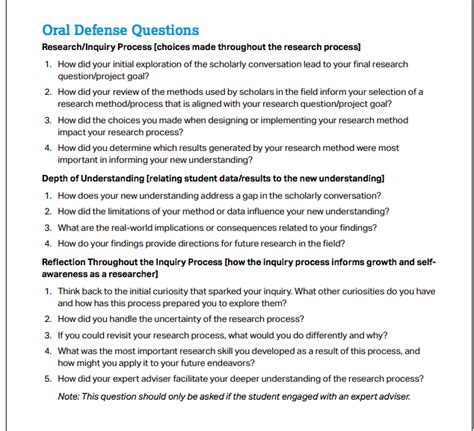Introduction

The AP Research Oral Defense is a culminating experience for Advanced Placement (AP) Research students. This rigorous assessment requires students to present and defend their research findings to a panel of experts. To ensure a successful defense, students must be well-prepared and anticipate potential questions that may be asked.
AP Research Oral Defense questions typically fall into the following categories:
- Research Design and Methodology: These questions assess the validity and rigor of the research methods used.
- Data Analysis and Interpretation: Questions in this category focus on the student’s ability to analyze data and draw meaningful conclusions.
- Discussion and Implications: These questions explore the broader implications of the research findings and their potential impact.
- Presentation Skills: Panelists evaluate the student’s ability to clearly and effectively communicate their ideas.
- Field-Specific Knowledge: Questions in this category test the student’s understanding of the research field and its relevant literature.
To avoid common pitfalls, students should:
- Lack of Preparation: Ensure thorough preparation by rehearsing and anticipating potential questions.
- Unclear Communication: Practice presenting ideas clearly and concisely, using appropriate technical language.
- Insufficient Evidence: Support arguments with credible evidence and data.
- Overly Technical: Strike a balance between technical accuracy and accessibility for the audience.
- Ethical Concerns: Address any ethical considerations or limitations related to the research.
- Review Research: Thoroughly review the research paper, focusing on the main arguments, supporting evidence, and limitations.
- Identify Potential Questions: Brainstorm questions based on the question categories outlined above.
- Prepare Answers: Draft comprehensive answers that demonstrate understanding, critical thinking, and a strong grasp of the research subject.
- Rehearse Presentation: Practice presenting the answers clearly and effectively, managing time effectively.
- Seek Feedback: Ask teachers, mentors, or peers to provide feedback on the presentation and answers.
Research Design and Methodology
- How did you determine the sample size and sampling method?
- What data collection methods did you use, and why?
- What steps did you take to ensure the reliability and validity of your results?
Data Analysis and Interpretation
- Describe the statistical tests you employed and justify their use.
- How did you handle outliers or missing data?
- What were the key trends or patterns observed in the data?
Discussion and Implications
- What are the most significant implications of your research findings?
- How do your findings compare to previous research in the field?
- Discuss the limitations of your study and suggest directions for future research.
Presentation Skills
- Summarize your research in 2 minutes.
- Explain the most important findings of your study.
- Respond clearly and concisely to questions from the panel.
Field-Specific Knowledge
- Describe the theoretical framework that guided your research.
- Discuss the key concepts and terminology used in the field.
- Explain how your research contributes to the broader body of knowledge in the discipline.
| Question Category | Common Questions |
|---|---|
| Research Design and Methodology | Sample size, sampling method, validity and reliability |
| Data Analysis and Interpretation | Statistical tests, handling outliers, data trends and patterns |
| Discussion and Implications | Research findings, comparison to previous studies, future research directions |
| Presentation Skills | Summary of research, key findings, response to questions |
| Field-Specific Knowledge | Theoretical framework, key concepts, contribution to the field |
| Mistake to Avoid | Impact on Defense |
|---|---|
| Lack of Preparation | Difficulty in answering questions, decreased confidence |
| Unclear Communication | Confusion among panelists, reduced understanding of findings |
| Insufficient Evidence | Weak arguments, diminished credibility |
| Overly Technical | Alienation of audience, difficulty in understanding |
| Ethical Concerns | Potential for bias, damage to scientific integrity |
| Step | Description |
|---|---|
| Review Research | Thorough comprehension of the research project |
| Identify Potential Questions | Anticipating and preparing for a range of questions |
| Prepare Answers | Comprehensive and evidence-based responses |
| Rehearse Presentation | Building confidence, improving clarity and effectiveness |
| Seek Feedback | Refining presentation, identifying areas for improvement |
1. How long is the oral defense?
Typically around 15-20 minutes, including presentation and questions.
2. How many panelists are there?
Usually two to three experts in the research field.
3. What is the purpose of the defense?
To assess the student’s research skills, critical thinking abilities, and understanding of the subject matter.
4. Is there a dress code?
Business casual or professional attire is expected.
5. Can I use visual aids during my presentation?
Yes, such as PowerPoint slides or graphs, but they should be used strategically and not detract from the verbal presentation.
6. What if I make a mistake during my defense?
Acknowledge the mistake, briefly explain how you would correct it, and continue the presentation.
7. How can I make a strong impression on the panelists?
Present clearly, confidently, and respectfully. Demonstrate a deep understanding of the research and be prepared to engage in thoughtful discussions.
8. What should I do if I don’t know the answer to a question?
Be honest and indicate that you don’t know the answer. Offer to follow up after the defense with the information.
